Among the many names folks have called Mississippi—from the Hospitality State to the Cradle of the Confederacy—“political trendsetter” probably doesn’t rank high on many lists.
On Nov. 6, 2012, the Magnolia State stayed essentially true to its near four-decade form. Moments after polls closed, pundits hitched the state’s six electoral votes onto presidential hopeful Gov. Mitt Romney’s little red wagon. Voters who went to the polls at the end of the 12-hour voting window barely had time to make it home before TV stations called it for the Republicans.
The devil’s in the details, though. One of the more interesting statistics to come from political wonk Nate Silver’s FiveThirtyEight blog on The New York Times’ website—which political websites nationwide are now using to spot trends—is that Mississippi has a relatively small percentage of voters that give Republicans their wins on the national level. Romney won the state by 11.8 percent last week, the seventh smallest margin of the states that went red in the U.S. In contrast, Romney won Wyoming and Utah’s votes by 69.3 percent and 72.8 percent, respectively.
For his part, Rickey Cole, chairman of the Mississippi Democratic Party, believes that the state is inching to the left. Looking at margins of victory for both candidates, Mississippi’s is 20th from the smallest.
“We were one of the very few states that gave (President Barack Obama) a higher percentage this year than we gave him in 2008,” he said.
The uptick from 2008 to 2012 was 0.7 percent. Younger Mississippians, those aged 18 to 29, also voted for Obama—by 55 percent. “We are moving the needle slowly in our direction.”
Cole pointed out that racial polarization lessens for younger people as a whole. At 46 years old, he counts himself among the first generation to experience school integration in Mississippi from the start. Those his age and younger just don’t have the charge on racism that older folks may still have, foretelling a time when race, in general, may not be as divisive. “The social distance remains, but it is decreasing,” he said.
“I’m not trying to be overly Pollyannaish about that. I know we have a long way to go, but we have come quite a long way.”
Saying that Mississippians are so-called values voters is a default position, Cole said, and says the fault lies with the state Democrats’ ineffective articulation of their message. They lose on social issues because they haven’t talked about the hard issues instead.
Cole points to the personhood initiative as one where informed voters made their voices heard, and he believes the electorate welcomes that level of discourse, which can be carried to even tougher issues. A CNN exit poll revealed that Mississippians revealed that the top three most important issues facing the country are the deficit, the economy and health care, not social issues such as abortion and gay marriage.
“It’s not that Mississippians aren’t reachable with a reasoned appeal on the issues,” Cole said. “It’s that candidates on either side haven’t made reasoned appeals. … We haven’t had campaigns that talk about the issues.” Democrats are supposed to appeal to people who think, he said, “and we haven’t been doing that.”
“We can’t just be cute about it. We can’t out-Republican the Republicans. We can’t trick the people into voting for us by claiming to be something that we’re not,” he added.
“We do have an obligation to present our case in such a way that it makes the voters think.
“… Republicans don’t win elections in Mississippi; Democrats give them away” Cole added. “And we have been doing that for far too long by, in my opinion, underestimating the common sense of the Mississippi voter.”
‘Mississippi Breakdown’
In terms of picking the nation’s presidents, Mississippi took a hard right turn in 1964, casting its lot with Republican Barry Goldwater over Democratic incumbent Lyndon B. Johnson and his Great Society ideals. Back then, it really was all about race: White citizens were loath to give up their supremacy, a fact they confirmed in 1968 when 63.5 percent voted for former Alabama Gov. George Wallace, a rabid segregationist who ran as an independent.
The last time Mississippians handed their electoral votes to a Democrat was in 1976, when evangelical Christian and former Georgia Gov. Jimmy Carter defeated incumbent Gerald R. Ford. Even then, the state wasn’t exactly an outlier: Nearly every southern state did the same, along with a considerable number of northern states.
Mississippi apparently corrected its temporary lapse of judgment in 1980 when it withdrew support for Carter to galvanize its votes for former actor, union organizer and former California Gov. Ronald Reagan—and it hasn’t looked to the left since.
The final Mississippi tally Nov. 6 shows a 55.5 percent win for Romney, with 43.5 percent voting for President Barack Obama.
“That is a classic Mississippi breakdown over the last two decades,” said Marty Wiseman, director of the John C. Stennis Institute of Government and professor of political science at Mississippi State University.
In national elections, Democrats automatically get 40 percent of the state’s votes, he said, based mostly along racial lines. Thirty-seven percent of Mississippi’s citizens are African American, and they tend to vote for Democrats about 95 percent of the time. In the final analysis, 96 percent of black Mississippi voters supported Obama.
Wiseman puts white Democrats at about 10 percent to 15 percent of the electorate. Factoring in the folks who don’t vote, he said, any election where the Democratic votes are in the low 40s is far from amazing.
“I wish there was a way to peel back the onion to figure out why Mississippi votes as it does,” Wiseman said. The state as one of the top three “net gainers” for federal funds; yet, majority voters are stuck on Reagan’s meme that government is the problem. The roots of that attitude snake back at least as far as the 19th century.
“We believe that the Civil War was a dastardly action by the federal government in Washington against the southern states, and Mississippi in particular,” Wiseman said. “Decade after decade after decade, the issues change, but our disdain and resentment toward Washington (is) a constant.”
“… That disdain has clouded the fact that we don’t mind having our hand out and taking all sorts of federal dollars from Washington,” he added.
Wiseman added that it seems many of the states that supported Romney in this election are gravitating toward attitudes Mississippi has held about the federal government for more than 100 years.
An AP exit poll reported that the majority of Mississippi voters said they had made up their minds months ago. Nine out of 10 white voters said they voted for Romney—the highest percentage of white voters of any state in the nation—and six in 10 voters said they believed the Republican former governor of Massachusetts was more in touch with people like them.
The racial breakdown played out as well in the tri-county area. Hinds County citizens (who are 69.1 percent African American) voted overwhelmingly, 72.2 percent, for the president. Rankin County (19.7 percent black) was Hinds’ near opposite, with 75.2 percent voting for Romney.
In Madison County, voters look more like the state’s average: 55.4 percent voted for Romney, 42.1 percent for Obama. Madison is 38.4 percent black.
Blue and Red
“Put me down in the column of agreeing with Marty (Wiseman),” said Jere Nash, a Jackson-based political consultant, left-leaning columnist and chief of staff to former Gov. Ray Mabus. Like Wiseman, Nash believes that nothing changed in Mississippi in this election.
Nash is pragmatic about why Mississippians vote the way they do. The Republican platform mirrors where most Mississippi voters stand on wedge issues, he said; the Democratic platform does not.
“If you talk to the average voter in Mississippi, almost in any geographical area of the state, it is more important where candidates stand on the whole range of social/cultural issues than where they stand on so-called ‘pocket-book’ issues. You can’t really talk to the average Mississippi voter about any of the environmental issues or economic issues or budget issues or infrastructure issues or health-care issues until you get past the social/cultural barrier. That’s religion, it’s gay marriage, it’s reproductive rights, it’s guns, it’s affirmative action—it’s all that stuff mixed in together, and all of that is more important than other public-policy issues.”
It’s a position that Madison lawyer and conservative columnist Andy Taggart doesn’t specifically agree with, though he says it’s generally correct. Nash and Taggart co-authored “Mississippi Politics: The Struggle for Power, 1976-2006” (University Press of Mississippi, 2006) and a humorous follow-up, “Mississippi Fried Politics: Tall Tales from the Back Rooms (Red/Blue Publications, LLC, 2008). Taggart was executive director of the Mississippi Republican Party and chief of staff to former Gov. Kirk Fordice, a Republican.
“Mississippians, and southerners in general, are very strongly driven by their social views,” Taggart said. African Americans, however, tend to be conservative on social issues, yet will still vote Democratic, he pointed out.
Mississippi’s voters did as Taggart expected, sending their congressional incumbents back to Washington, D.C. On the national level, the results took him by surprise.
“I really thought ’til late into the night that Mitt Romney was going to win the election,” Taggart said. He thought the Republican candidate gained enough momentum after the first presidential debate (where Obama had a less-than-stellar performance) to carry him to victory. “I just missed it.”
The outcome didn’t surprise Nash. He checked Nate Silver’s blog “four or five times a day,” he said. Republicans could have saved themselves a bit of shellshock if they had done the same: Silver gave President Barack Obama a 90.1 percent chance of winning the election before the polls closed Tuesday, and he accurately predicted how the electoral college would vote in every state, including Florida, which took until Nov. 10 to put its 29 electoral votes in Obama’s column.
For the foreseeable future, meaning the next couple of decades, Taggart believes it will be very difficult for Democrats to win statewide office in Mississippi, with the exception of the state Attorney General Jim Hood, who has the power of incumbency behind him. Mississippi will be a “reliably red state in national politics,” Taggart said,
“I don’t see any change in terms of partisan makeup,” Nash said of his look at exit polls in the state. “I do think it is possible to rally a majority around progressive, specific progressive public policies. The groups that opposed the personhood initiative in 2011 show that you can bring all kinds of groups to the table on a specific public policy. The people who have opposed charter schools have shown that you can bring Republicans and Democrats and Independents to the table to rally around a specific public policy. I think for the near-term future that’s where the emphasis ought to be placed.”
What The People Need
Mississippi state Rep. Adrienne Wooten, D-Hinds, believes that the 43.5 percent Mississippi voters gave to Obama is a milestone. She was surprised to learn that the 2008 vote also topped 40 percent. In a state that votes predominantly Republican, however, she sees a shift away from party loyalty.
“You do have a lot of folks who are saying, ‘It’s not about a particular party; it’s about the issues and where a particular party stands on the issues.’ I think people are becoming more educated on the issues themselves,” she said. “… They want to be considered as an educated, thinking voter.”
Women’s issues were a big factor, Wooten said, and “(Republicans’) positions were certainly not in the best interest of women.”
In the male-dominated political environment, some people cannot, or will not, empathize with women, Wooten said, even though women are a powerful voice in American politics and the electorate. The GOP faithful seemed not to educate themselves on the reality of women’s issues, choosing instead to simply follow the party line regarding women’s reproductive rights.
“It was kind of like the blind leading the blind to me,” she said. “… You are so willing to support the party that you don’t care that the policies that the party is advancing is not within the best interests of someone that you say that you love.”
Becoming more informed on the issues, primarily because of the ubiquity of information via the Internet, guided voters’ decisions regarding the economy as well, Wooten said. “Obama didn’t have anything to do with this,” she said about where the blame should fall for the economic mess the country is in, and that information is freely available—from the beginning of the crash under the George W. Bush administration to the obstructionism of the Republicans in Congress during Obama’s first term.
“We, as Americans, are kind of tired of having politicians attempting pull the wool over our eyes,” she said, a fact the voters demonstrated at the polls. “(Republicans) wanted us to believe that what they were telling us was the truth, … that we would be so unlearned that we would not have the ability to see what actually had taken place.”
“People are waking up and becoming more involved in the political process, becoming more aware,” she added. Voters understand that politics have a direct impact on their lives and the lives of their loved ones.
Race remains a complicating factor in Mississippi, Wooten said.
“Republicans feel that (their) party is for white folks,” she said, resulting in the party pushing everyone who doesn’t fit that description into the Democrat’s camp, then painting the Democratic Party as the African American party. “In fact, that’s not true,” Wooten said, and it only takes looking at the data to see who benefits from social programs advanced by Democrats: people of all races.
In Mississippi, upper-income people do not define the majority, and what’s true in Mississippi is true throughout America. “(Republicans) are really disillusioned, to a certain extent,” she said. “… They’re not taking into consideration what their constituents really need.”
“It’s not about black or white,” she added. “It’s about people and life’s circumstances.”
It’s the Demographics, Dummy
Of all the punditry about the elections, one thing that the Republican Party can’t ignore is the shifting demographics of the country. Experts estimate that by 2050, the United States will be a majority minority country. In other words, non-white citizens—and voters—will soon exceed whites. That fact is reflected in the Republican’s recent loss.
“What did they get? Sixty-five percent of the white vote, and (they) still lost the election in a big way,” Wiseman said. (The final tally shows Romney got 59 percent of the white vote, nationwide). Hispanics are a huge part of the minority vote that put Obama over the top nationally. He got 71 percent of the Latino vote and 93 percent of the African American vote.
Wiseman pointed out that Republicans had an opportunity to pass a comprehensive immigration bill during the George W. Bush administration but didn’t.
“If they had gotten that bill passed, Romney would have won (Nov. 6),” Wiseman opined. “… The whole thing is demographics, and Republicans—the hard right of the Republican Party and the more sensible of the Republican Party—are going to have to sit down and choose whether to get as far right as they can and be ideologically pure and lose every time, or if they are going to spread the base, the tent, as wide as possible and begin to appeal to African American and to Hispanic voters. If they do that, then the Democratic Party has problems.”
Nash doesn’t see the shift affecting Mississippi, yet. “The demographic changes that you see happening in the country, with Asians, with Hispanics, with young folks, you just aren’t seeing in Mississippi,” he said. “… There’s a slight gender gap, but it’s only because women support the Republicans less than men support the Republicans,” Nash said. “You don’t see the 15-point differential that you see in other states.”
Overall, Mississippi women voted 53 percent for Romney, while 58 percent of men voted for the Republican.
“I would not agree with the premise that the nation has changed in some sort of systemic way from a demographic standpoint and that Republicans can’t regain our footing,” Taggart said. He agrees that the groups that carried Obama to victory—Hispanics, African Americans, women and young people—have not been strong in the Republican camp of late. But, he said, “assuming that demographic is accurate, that doesn’t worry me at all from the standpoint of being a Republican and our ability to take our message to the voters.”
Taggart believes that nationally, Republicans have a presentation problem, not a policy problem. “We need to be very focused on the forward-looking optimism and winsomeness that ought to mark our system of beliefs and our philosophy of government,” he said. “… One of the challenges we’ve faced is that we’ve sort of been perceived as grumpy or curmudgeonly. I really do believe that the world view that conservatives have about the way that government ought to operate, and the freedom and opportunity that ought to be granted to individual citizens is a very optimistic and forward-looking world view and that we just need to present it in a more winsome fashion that’s attractive and personable and engaging to people.”
Cole takes a tougher position for the Democrats in the state. “The lesson coming out of Tuesday is that organizing at the grass roots, the ground game, whether it be door to door, phone banking or social media, that’s what made the difference for the president, and we intend to employ those same tools in Mississippi over the next four years, over the next decade to make Democrats competitive in Mississippi.” Cole is already busy working to recruit candidates for the upcoming municipal elections in 2013.
“We’re never going to stop,” he said.
Cole’s Project 1876 is about halfway to its goal of putting a Democratic team in each of the state’s 1,876 voting precincts.
“We’re trying to end the old joke from Will Rogers, who said very famously that he was not a member of any organized party—he was a Democrat,” he said. “We think that organizing is an effective counter to the strategy of throwing money at an election.”
Turns out, though, that the Republican Super PAC strategy of drowning candidates in a flood of cash didn’t turn out particularly well this year. The Sunlight Foundation, a Washington, D.C.-based nonpartisan nonprofit group, tracked the Super PAC’s investments into the 2012 Congressional elections. (For that analysis, it did not look at groups focused on presidential candidates, for which the outcome was obvious.)
American Crossroads, for example, spent $104.7 million without a single candidate it backed pulling out a win. It put 1.29 percent of its funds toward opposing two candidates who lost, putting their return on investment at 1.29 percent. PAC winners included unions and Planned Parenthood’s two groups: Planned Parenthood Votes’ ROI was 98.59 percent; it spent $5.1 million to back seven winning candidates and opposed seven candidates who lost.
Cole believes that the political “800-pound gorilla” is the cost of health care and expansion of Medicaid.
“Phil Bryant’s rhetoric to the contrary, I believe it would be irresponsible to the extreme for Mississippi not to participate in the Affordable Care Act, not to leverage every federal dollar we can into our health-care system. … I believe the right policy and the right politics is going to be on the side of expanding the program to make sure that health care and wellness is provided to many more Mississippians—working Mississippians.” Issue No. 2, Cole says, will be for-profit charter schools.
The next national election for Mississippi is in 2014, with Sen. Thad Cochran up for re-election that year. The NAACP is suing over current redistricting boundaries, which could push some statewide legislative elections up from the scheduled 2015 timeframe. Regardless, Cole intends that the party is ready to field a solid slate of Democratic candidates to counter the swing to majority Republican in the U.S. House of Representatives, and the statewide offices and state Legislature. He also has an eye on municipal and county seats.
“Our problems in Mississippi are not unique,” he said. “Most of the states in the South have had similar losses or greater losses. … We are in the transition to a truly competitive two-party system in Mississippi.”
Forward
When it comes to prioritizing issues, one thing seems clear: The state of gridlock inside the beltway is a big part of the problem, and the president and Congress need to get it resolved quickly.
The economy and the federal debt is the nation’s No. 1 priority in the opinion of voters and political experts.
“Somehow, the very concept of compromise has got to be re-injected into the legislative process,” Wiseman said. “When we walked out of convention hall in 1787 in Philadelphia, we had spent several sweaty months working through compromises to even write a Constitution. And the whole darn thing, the way this unique government with three branches and three levels works is through compromise. It will not work any other way.”
Wiseman said working together was imperative in the face of the looming “fiscal cliff,” which will make cuts without any considerations and end the Bush-era tax cuts. “We better figure out how to compromise in a hurry, because as compared to a lot of elections where you have a lame duck to do a little bit of cleanup work and so forth, that isn’t the case this time,” he said.
The voter’s are also concerned about health care, and that means figuring out how and where to get on board with Obamacare, which means accepting $9 billion in federal dollars for Mississippi.
“Now that we’re past all the election rhetoric, hopefully, everybody will sit down and figure out a way to get it done,” Wiseman said.
And getting it done is exactly what the voters have asked for in this election.
“Now it’s all about performance in office,” Nash said. “… Now we’ll see if they’re up to the task.”
CORRECTION: In the original version of this story, Rep. Adrienne Wooten's last name was missing on first reference. The Jackson Free Press apologizes for the error.

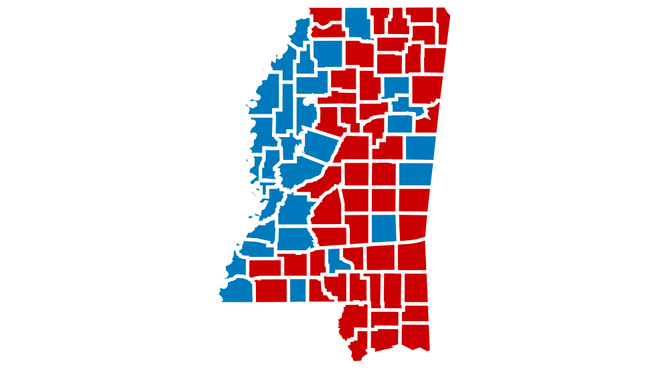
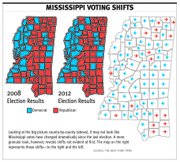
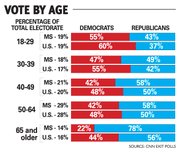
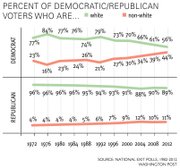
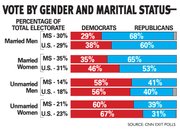
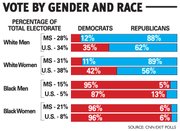
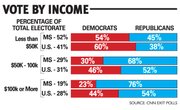
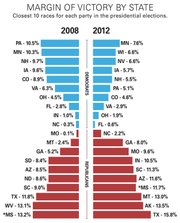

Comments